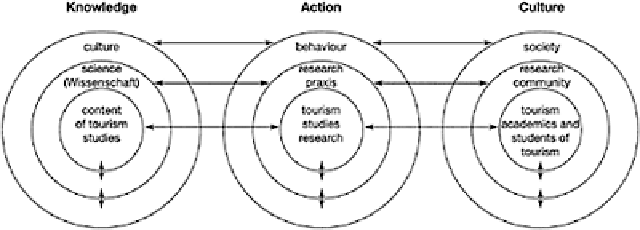Geography Reference
In-Depth Information
identified are at the levels of the empirical and the actual and the solutions
advanced do not attach the real, the processes that produce the current
problems. Symptoms are treated, not causes. Arguments for a more
fundamental applied geography, especially applied human geography,
seek to distance the discipline from links with governments, public
services and commercially oriented enterprises.
(Johnston 1985a:21)
The problem in tourism and recreation is that the organisation, management and funding
of research is primarily a public and private sector activity. In this sense, it raises moral
dilemmas for the geographer since it is increasingly difficult to disengage from the public
policy framework or economic/ decision-making context in which research is
commissioned or undertaken. Indeed, detachment can lead to valid criticisms of academic
'ivory towers' and a fundamental failure to engage in critical public and private sector
policy making.
Tourism geographers are a subcommunity of the geographic community within the
wider community of academics, scientists and intellectuals which is itself a subset of
wider society; that society has a culture, including a scientific subculture within which
the content of geography and tourism is defined. Action is predicated on the structure of
society and its knowledge base: research praxis is part of that programme of action, and
includes tourism research. The community of tourism academics is therefore an
'institutionalizing social group' (Grano 1981:26), a context within which individual
tourism academics are socialised and which defines the internal goals of their
subdiscipline in the context of the external structures within which they operate (after
Johnston 1991). The content of the subdiscipline must be linked to its milieu, 'so that
disciplinary changes (revolutionary or not) should be associated with significant events in
the milieu' (Johnston 1991:277). Similarly, Stoddart (1981:1) in his review of the history
of geography stated, 'both the ideas and the structure of the subject have developed in
response to complex social, economic, ideological and intellectual stimuli'.
'The contents of a discipline at any one time and place reflect the response of the
individuals involved to external circumstances and influences, within the
Figure 1.2:
The context of tourism
studies
Source:
after Grano (1981)




